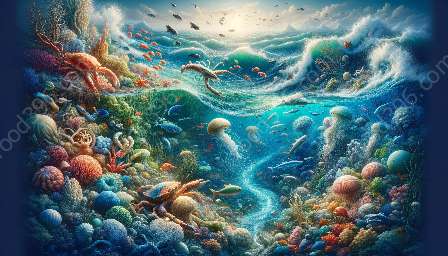Marine pollution is a grave issue that has far-reaching and devastating effects on oceanography, ecology, and seafood production. Understanding the implications of marine pollution is crucial in addressing this critical concern and developing solutions to mitigate its impact.
Marine Pollution and its Impact
Marine pollution, also known as ocean pollution, refers to the introduction of harmful substances into the marine environment. These substances can originate from a variety of sources, including industrial activities, agricultural runoff, oil spills, and plastic waste.
Effects on Oceanography
Marine pollution significantly affects oceanography, the scientific study of the ocean and its processes. The presence of pollutants in the marine environment can disrupt ocean currents, alter water chemistry, and impact the distribution of marine organisms. Toxic compounds can accumulate in the water and sediments, posing a threat to the overall health of marine ecosystems.
Implications for Ecology and Seafood Production
The ecological consequences of marine pollution are dire, as it disrupts the delicate balance of marine ecosystems. Pollution can lead to the decline of marine species, including fish, shellfish, and other seafood resources. Furthermore, contaminants can accumulate in seafood, posing serious health risks to consumers.
Addressing Marine Pollution: Oceanographic and Ecological Considerations
To combat marine pollution, it is essential to integrate knowledge from oceanography and ecology. Oceanographers play a crucial role in monitoring the spread of pollutants, understanding their transport mechanisms, and assessing their impact on marine ecosystems. By studying ocean circulation patterns and water quality, oceanographers can provide valuable insights into the distribution and fate of pollutants in the marine environment.
Ecologists contribute to the understanding of how marine pollution affects biodiversity, food webs, and the overall health of ecosystems. By conducting research on the ecological impacts of pollution, ecologists can inform conservation efforts and management strategies to protect vulnerable species and habitats.
Seafood Science and Sustainable Practices
Seafood science encompasses a multidisciplinary approach to seafood production, quality assurance, and safety. In the context of marine pollution, seafood science plays a vital role in ensuring the safety and sustainability of seafood resources. Through innovative technologies and rigorous testing protocols, seafood scientists can detect and mitigate the presence of pollutants in seafood products.
Furthermore, seafood science emphasizes the importance of sustainable practices in aquaculture and wild-caught fisheries. By incorporating principles of environmental stewardship and responsible harvesting, seafood science aims to minimize the impact of pollution on seafood production and promote the long-term viability of marine resources.
Conclusion
Marine pollution poses a significant threat to oceanography, ecology, and seafood production. By understanding the intricate connections between these fields, we can develop holistic approaches to address the challenges posed by marine pollution. Through collaborative efforts in oceanography, ecology, and seafood science, we can work towards preserving the health and abundance of our oceans for future generations.

